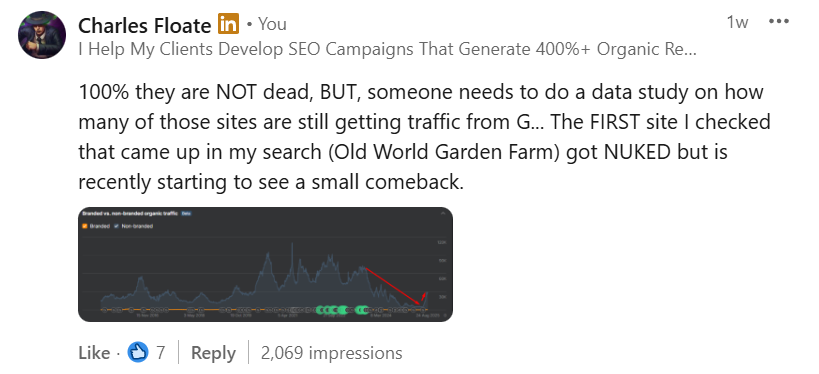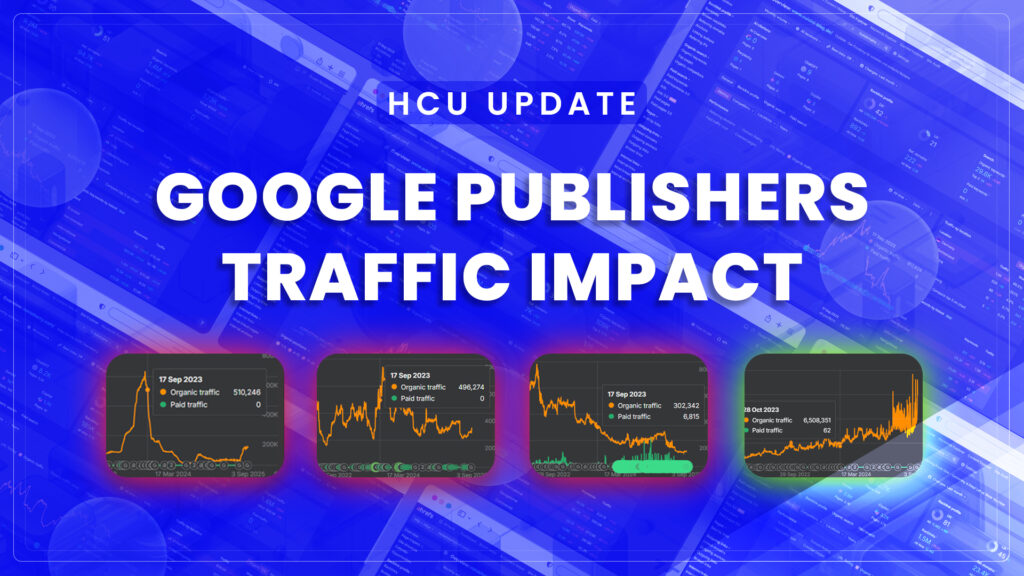I commented on a Linkedin post by Fery Kaszoni last week –

The post was about a case study series that Google has been running for a few years on publisher success stories inside search.
These case studies aren’t from random hobby bloggers. These are specifically pre-selected “model citizens” that Google can rely on to follow their guidelines and be shining examples for the rest of the web…
Niche experts. High quality publishers. The kind of operators you’re told to emulate if you want to survive updates, and should not only be surviving themselves, but thriving!
So we decided to check if the propaganda matches reality.
I had my team pull every single domain featured in Google’s publisher stories (190 in total, so far) and tracked what happened to each sites organic traffic across the wave of updates since before HCU in August, 2022.
The Numbers Don’t Lie
Out of 190 sites, we split them into two groups:
-
The losers → Sites that lost traffic post-HCU.
-
The winners/recoveries → Sites that gained or bounced back.
Here’s what we found:
-
Losing sites lost an average of –58.92% of their traffic.
-
Winners only gained +37.3% on average.
That means the losers lost 21.62% more on average than the winners gained…
Think about that. Even when a site did “recover,” it barely scratched back half of what the losers bled out.
That means the majority of Google’s own handpicked, supposedly the cream of the crop publishers, have tanked.
And that traffic didn’t just vanish into thin air. Google shifted it. Mostly to itself. To its UGC darlings (Reddit, Quora etc). To YouTube. To AI Overviews. To Shopping carousels, and, surprise, surprise, to more ads (hidden just enough to not trigger any legal repercussions) than ever before…
Google didn’t “reward quality.” It reallocated traffic into its own ecosystem and partners.
In my opinion, Google did this all on purpose.
-
They hand picked these publishers.
-
They marketed them as proof that “quality wins.”
-
Then their own algorithm updates slaughtered the very same examples.
This is what makes it propaganda, not guidance.
Or you could just listen to John Mueller and wait for the next update to recover your site…
📊 Google Publishers Traffic Impact Report
The Bigger Picture
This study isn’t about a few unlucky sites, if anything these got off a LOT lighter than most independents & publishers did from my analysis. It does prove a systemic shift though:
-
Traffic is consolidating to Google and its corporate partners.
Zero click SERPs, AIOs, Discover, YouTube, Amazon. The monopolization (and centralization) is deliberate, even if they did just get a slap on the wrist in court. -
“Authority bias” trumps expertise.
Five year old Reddit threads rank over fresh, expert written articles. Authority is being redefined as scale, consensus and engagement, not accuracy, expertise and dedication. -
Niche publishing is being strangled.
Google’s propaganda told independents to play by the rules, but the rules changed. Now UGC, MSM and commerce giants dominate. -
The trust contract is dead.
Google can’t claim “do quality and you’ll be safe” when even their own poster children can get obliterated.
Google told the industry: “Be like these sites.”
We checked.
And the sites showcased have, on average, been destroyed.
That isn’t an accident. That isn’t a blip. That’s the business model.
Stop treating Google like a benevolent referee. It’s a casino. And the house always wins…
The Path Forward
So where does that leave us?
-
Diversification isn’t optional. Build lists, build audiences, build communities. If your business model is “wait for the next core update,” you’re dead already.
-
Exploit loopholes while they last. Parasite SEO, authority/entity stacking, domains, redirects, programmatic, AI content, whatever channel gets you cashflow before Google shuts it down…
-
Play where Google is weakest. Non-English SERPs, high GDP small markets, intent shifts, and launchjacking/newsjacking they can’t keep up with.
-
Reverse engineer, don’t trust. The ONLY playbook is the SERP itself. Track volatility, spot where they’re bleeding, and attack.
Basically all the same things I’ve been hammering on about since way before HCU anyway!
My Final Thoughts
At this point, the debate isn’t whether Google is actively trying to steal clicks, or the algo is broken, it’s whether you’re willing to keep pretending it’s not.
You don’t need another promise from Google. You need a plan that assumes the house is rigged and plays accordingly.
Because the real “helpful content update” wasn’t in the algo. It was Google telling the world exactly what it thinks of the publishers and people that have powered it’s business for the past 20+ years:
That you’re all expendable.


